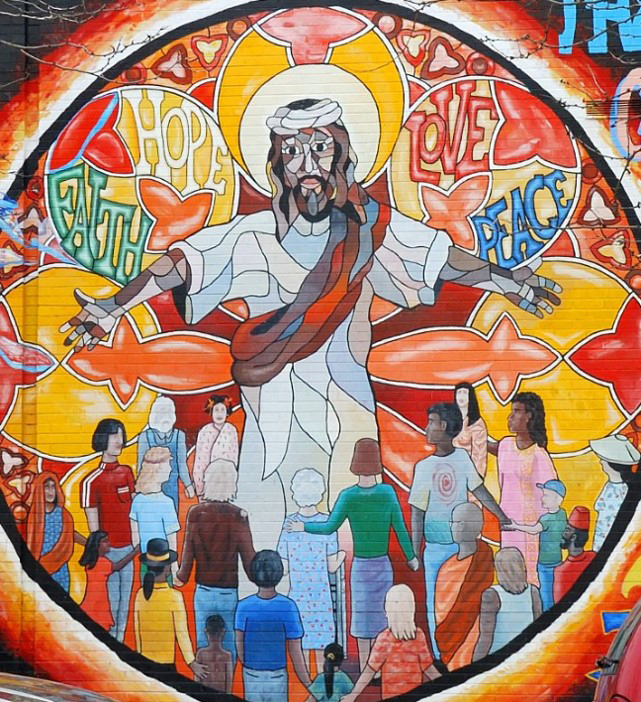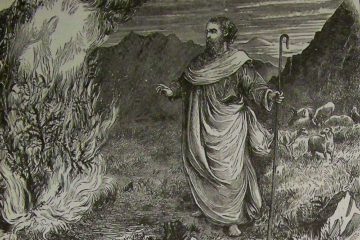Sermon: Panhandling for Love

This sermon was delivered in Santee Chapel at Lancaster Theological Seminary on November 6, 2021. The text for this sermon is Mark 12:28-34.
Our Need to be Loved
Panhandling for love — this the image that comes to mind for me when I think about our most basic human need, the need to be loved. It’s a sad fact that so many people in this world do not experience love. Feeling unloved is an experience that most of us have felt at some point in our life, and we all know what can happen when we feel unloved. When our hearts ache for love, our mind and body will often go looking for alternatives. We go panhandling for love and fulfillment, and we often turn to things that are harmful and transgressive: drugs and alcohol, overeating, sexual impropriety, or the wanton pursuit of money and power.
Or, to put it in theological terms — when we feel unloved, we often turn to that chief human comfort: sin. I believe that much of the sin and suffering of this world can be traced back to a lack of love. Love is such a critical need for us, so we should pay attention whenever Holy Scripture starts talking about love.
What Mark Says about Jesus’ Love
Now, most of us are familiar with the words of a popular Sunday School song: “Jesus loves me, this I know, for the Bible tells me so.” This may be true, but the Gospel of Mark doesn’t exactly spell it out for us. In fact, Mark only uses the word “love” five times, four of which are in today’s reading. And today’s reading does not talk about the love that we receive from Jesus: it is entirely focused on the love that we are to give.
Jesus lifts up the commandment that humans are to love God, and to love their neighbors. Jesus does not tell us here that we will receive love from God or our neighbor in return. Jesus divorces the concept of loving from the expectation of receiving love in return.
The love that Jesus teaches about is both unconditional and unearned. We are to love God as best we can — even if we have doubts and uncertainties about God. We are to love our neighbor as best we can — even if our neighbor is difficult to love. And Jesus doesn’t just teach about this kind of love — he lived it. Jesus came to earth and became human to save us — to redeem us from error and sin and death, and to bring us into truth and righteousness and new life. Humanity did nothing to earn Jesus’ love, and humanity did not return Jesus’ love: instead, we repaid him with mockery, humiliation, torture, and execution.
Everything Jesus did, he did for us; not because we loved him, but because he loves us.
Love in the Beloved Community
And Jesus’ teaching about love– and the loving example of his life — set the pattern for how we, who long for the Beloved Community, are to approach love. We must love, without expectation that our love will be reciprocated. We must love, without regard to whether we judge the recipient to be worthy. We must love, without counting the cost. We must love as recklessly and as radically as Jesus did.
This kind of radical, selfless love has the power to create new relationships, and to build communities that are strong and resilient. And while loving your neighbor may or may not cause that neighbor to love you back — nevertheless, leading a life of love will eventually envelope you in loving relationships and you will find yourself in a loving community. So when we feel the lack of love in our lives, the answer is not to go panhandling: instead, we should follow Jesus’ example and pour out our own love into the world. When we do this, we help to create that Beloved Community which the world — and each of us — so desperately longs for.
The Communion of Saints
Because this is the season when many Christian communities remember the dead, we should also reflect on the relationship between love and death. Love has a transcendent power that exceeds the power of death. When a loved one dies, we don’t stop loving them — in fact, sometimes we love them even more. And that love is more than sufficient to maintain a bond between the living and the dead. The loving communities we create in this world are not damaged by death; we remain in community with all those whom we love, but see no longer [BCP 504].
In my tradition, we have a special term for this: the Communion of Saints. In our baptism, all of us are united as one body in Jesus Christ; the death of a member of the body of Christ does not separate them from that body. Saint Paul taught us that nothing, not even death, can separate us from the love of God in Christ (Romans 8:31-39). And since we are all united in Christ, then nothing can separate us from one another.
In truth, we are never far from those who have gone before us. They join with us in our worship and adoration of God — when we celebrate Holy Communion, we join our voices with the saints when we sing “Holy, Holy, Holy Lord!” As we go about our daily lives in faith, we are supported and encouraged by that “great cloud of witnesses” (Hebrews 12:1) who have completed their course in faith. And we share with them “in the sure and certain hope of resurrection to eternal life” [BCP 501], a life that we will share together with them.
Conclusion
Love triumphs over death.
Love triumphs over sin.
Love triumphs over the brokenness, and wickedness, and indifference of this world.
Our human longing for love reflects our Christian desire for the Kingdom of God — that Beloved Community where God and humanity live together in perfect love. So when we feel like panhandling for love, remember — what we really desire is that Beloved Community. May God grant us the courage to follow the example of Jesus and pour out our own love on this broken world.


